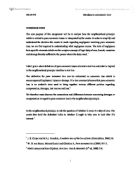How do the cases discussed in unit 3 contribute to our understanding of the aims of tort law?
How do the cases discussed in unit 3 contribute to our understanding of the aims of tort law?
There are various disparate aims of tort law and they are exercised in different cases and for different reasons. One of the aims of tort law is known as loss spreading and this basically seeks to distribute loss so that liability falls on the stronger party.
In the case of Nettleship v Weston, the claimant N was held not to have voluntarily contributed to the harm done because he had checked out the issue of insurance. The learner driver was also held liable because she owes a duty of care same as any experienced driver so she could not argue that she was trying her “incompetent best”. In this case, Lord Denning also held that morally, the learner drive is not at fault but legally, she is held liable because she has insurance and it is therefore fair that the burden should fall on her. This embodies a new aim of tort law which is “on whom should the risk fall?” This case helps to add to our understanding, different aims of tort law. C. Harlow has described tort as having various disparate aims. Under the heading of loss spreading, “Atiyah suggests that the principal function of tort is ‘social insurance’ ”. This can be observed in the above case and it is basically a situation whereby the courts seek to place liability on big companies for instance or persons who are better able to afford the costs. This can be linked with the idea of the one with the deeper pockets should be liable. Also linked to this is the aim of insurance and deterrence. Deterrence is not so much an issue in this case but insurance as we can see is very much a part of the case. Without insurance, there would be no tort law because insurance helps people protect themselves against future occurrences without which they would be unable to afford the costs. An example is the fact that all drivers must have compulsory traffic insurance.







